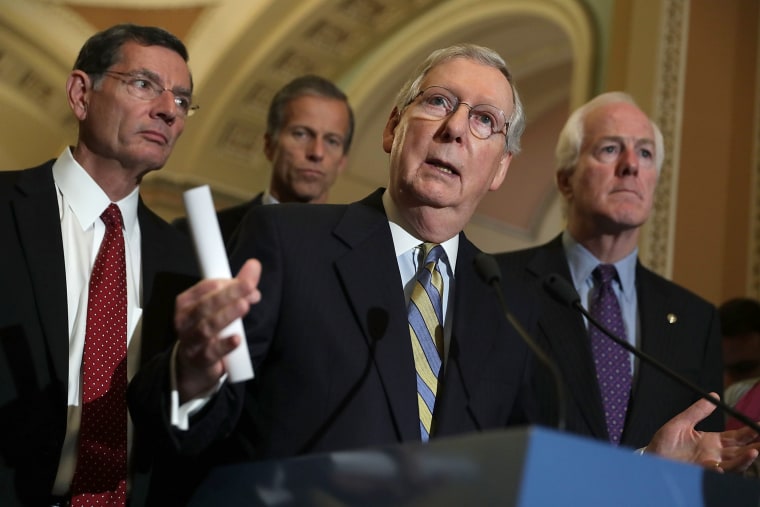WASHINGTON — Senate Republicans unveiled their tax overhaul plan Thursday as the GOP races to pass President Donald Trump’s top priority before their self-imposed Thanksgiving deadline.
The Senate plan differs in some key ways from the version introduced by the House last week.
The release of the Senate bill sets the stage for talks among the White House, Senate and House to reach agreement on a final bill in the weeks ahead.
Senate Majority Leader Mitch McConnell, R-Ky., said the bill will deliver "new jobs and opportunities and tax relief for the middle class."
The drubbing the GOP took in Tuesday's elections only seemed to intensify Republicans' desire to notch a major accomplishment before the close of the year, which has been filled with legislative disappointments for Trump and his party.
Republicans can lose only two votes in the Senate to secure the majority needed to pass the tax bill, unless they can woo some Democrats to vote for it. That seems unlikely, even after some last-minute courting by White House officials at a private meeting Tuesday with moderate Democrats.
The Senate bill maintains the current seven individual income-tax brackets, unlike the House's four, and lowers the top rate to 38.5 percent, while the House bill maintains it at 39.6 percent but applies it to higher income.
And unlike the House version, the Senate bill would fully repeal the deduction for state and local taxes, which has become a sticking point with GOP congressmen from high-tax states like New York and New Jersey, which tend to lean Democratic, whose constituents depend on that deduction.
The House included a deduction for the first $10,000 in property taxes to appease those members, but the Senate, which has fewer Republicans from such states, has no such provision in its bill. In the end, the House may be forced to swallow whatever the Senate passes and it's unclear if dissenting lawmakers from high-tax states have enough numbers to prevent it.
White House congressional liaison Marc Short defended the provision on MSNBC, saying it served the goal of simplifying the tax code by eliminating deductions. "We're actually seeing the majority of Republicans in New York, New Jersey and California who are supporting the bill," he said.
The Senate plan would be more generous than the House, however, on the mortgage interest deduction, imposing a cap of $1 million on new homes to qualify compared to the $500,000 set by the House. And it would preserve the medical expenses deduction, which the House looked to scrap.
The Senate version also would delay a drop in the corporate tax rate from 35 percent to 20 percent by one year after passage, unlike the House version, which would have the cuts kick in right away.
Early reports of the delay in making public the Senate tax plan sent the Dow Jones Industrial average down more than 200 points, though business interests had worried the phase-in would last even longer and the market recovered.
The Senate would boost the child tax credit to $1,650 and raise the income threshold for the measure. And like the House plan, the standard deduction would be doubled to $12,000 for individuals, $24,000 for married couples and $18,000 for single parents.
However, Sens. Marco Rubio, R-Fla., and Mike Lee, R-Utah, who have been pushing for an expanded child tax credit, said they were not satisfied. "While we are glad to see an increase to the child tax credit, like the House bill, it is simply not enough for working families," they said in a joint statement.
The Senate bill would reduce the number of wealthy people who pay the estate tax by doubling the current threshold for the tax, which currently kicks in for individuals on estates worth over $5.6 million. The House bill eliminates the estate tax entirely.
And some Republicans continued to push for the tax bill to include a repeal of the Affordable Care Act's individual mandate, which lawmakers in both chambers had considered adding to their legislation. Sen. Tom Cotton, R-Ark., called the proposal "a good start," but added, "it would be so much better if we repeal Obamacare’s hated individual mandate."
Meanwhile, on the other side of the Capitol, the tax-writing House Ways and Means Committee voted along party lines Thursday to move ahead with a newer version of their plan.
“The bill is passed, the committee is adjourned,” Brady says to the applause of fellow Republicans.
The full House hopes to vote on the tax plan next week, giving lawmakers little time to review the plan, which will likely stretch hundreds of pages long.
In the newer version, the House reversed course on eliminating the adoption tax credit after an uproar from social conservatives (the Senate version preserves the credit). And the updated House plan also includes a new lower tax rate for businesses earning less than $75,000 in income, among other changes.
If both chambers pass a different bill, either one will have to pass the other's or they'll have to find a compromise between the two before sending it to Trump's desk.
Senate Republicans are using special budget reconciliation rules that prevent a Democratic filibuster. But those rules also require that the bill not raise the deficit by more than $1.5 trillion, leaving lawmakers scrapping for revenue to offset cuts.
That could force them to scramble for more revenue as the process moves along.
"We’re going to be in moving and shaking mode for the rest of this month, that’s for sure," said Sen. Orrin Hatch, R-Utah, who chairs the powerful Senate Finance Committee.



